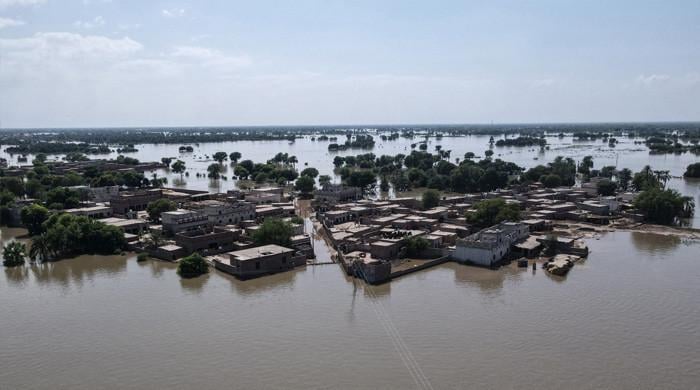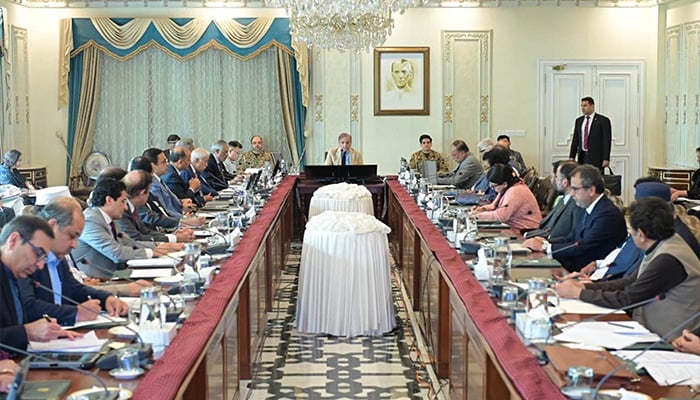 |
| An aerial view shows partially submerged residential houses in Jalalpur Pirwala, in the Multan district of Punjab on September 9, 2025, after the Chenab River overflowed following heavy monsoon rains. — AFP |
Pakistan Declares Climate and Agriculture Emergency After Devastating Floods
The announcement was made by Federal Minister for Parliamentary Affairs Dr Tariq Fazal Chaudhry in a press conference along with Petroleum Minister Ali Pervaiz Malik after a federal cabinet meeting chaired by Prime Minister Shehbaz Sharif today.
The federal government on Wednesday
announced a national climate and agriculture emergency following
catastrophic floods that have caused severe human and financial losses across
Pakistan. The declaration was made after a high-level federal cabinet meeting
chaired by Prime Minister Shehbaz Sharif in Islamabad, underscoring the
urgent need for coordinated action to tackle the escalating challenges of
climate change and food security.
Federal Government
Declares Climate Emergency
Federal Minister for Parliamentary
Affairs Dr Tariq Fazal Chaudhry, accompanied by Petroleum Minister Ali
Pervaiz Malik, confirmed the cabinet’s decision during a press briefing. He
said that the prime minister had not only acknowledged the seriousness of the
situation but had also directed immediate enforcement of a climate emergency.
“Climate change has become one of the
most pressing global concerns, and Pakistan is among the countries paying the
highest price,” Chaudhry stated. “Decades of neglect, deforestation, and
unchecked encroachments on natural waterways have worsened the current flooding
crisis.”
He revealed that the Ministry of
Climate Change has been tasked with preparing a comprehensive report within
15 days. This report will outline both the extent of losses and strategies to
mitigate future risks.
 |
| PM Shehbaz Sharif chairs federal cabinet meeting in Islamabad on September 10, 2025. — PID |
Rising Floodwaters
and Regional Impact
Over the past three years, Pakistan has
witnessed repeated devastation from floods, with Khyber Pakhtunkhwa,
Gilgit-Baltistan, and Punjab suffering the heaviest damages. Now, the
floodwaters are flowing into Sindh, raising fears of further destruction.
The minister warned that while relief
efforts were underway, “the danger is not yet over,” as swollen rivers and
streams from the five-river basin continue to move downstream. He said
prayers and resources were being directed towards minimizing the potential
damage in Sindh.
The floods have destroyed homes,
displaced thousands, and inflicted large-scale damage on agriculture —
Pakistan’s economic backbone. With crops such as wheat and cotton
submerged, the cabinet emphasized the urgency of declaring an agriculture
emergency to assess losses and formulate compensation mechanisms for
affected farmers.
Agriculture Emergency
and Farmer Support
Prime Minister Shehbaz Sharif said the
agriculture emergency was necessary to safeguard the livelihoods of farmers and
ensure food security. He noted that nearly 1,000 lives have already been
lost, while vast stretches of cultivable land remain underwater.
The government aims to create a comprehensive
roadmap for disaster preparedness and climate resilience. Provincial governments,
he stressed, will play a crucial role.
“This country belongs to all of us,”
Chaudhry said. “Together, through the support of provinces and stakeholders
from Gilgit-Baltistan and Azad Jammu & Kashmir, we must confront
these challenges.”
The prime minister has called for an immediate
meeting with provincial chief ministers to coordinate a joint response,
including compensation packages for affected families and farmers.
Federal and
Provincial Partnership
During the meeting, PM Shehbaz
emphasized that both federal and provincial governments would share the
responsibility of compensating losses. This united approach, he said, was
critical to restoring livelihoods and rebuilding trust among the people hardest
hit by climate disasters.
The cabinet also deliberated on the
need for long-term reforms, including climate-resilient farming
techniques, water management strategies, and renewed efforts in forest
conservation.
Pakistan-China
Cooperation in Agriculture and Climate
The meeting also touched upon Prime Minister
Shehbaz’s recent visit to China, where he discussed avenues for
bilateral cooperation. He said the Pakistan-China B2B Investment Conference
in Beijing had resulted in agreements worth $8.5 billion, much of
which would directly support agriculture and climate resilience.
Under the second phase of the China-Pakistan
Economic Corridor (CPEC), agriculture will remain a major focus. China has
committed to providing 85% of investment in agriculture projects, with
Pakistan contributing 15%. The projects will aim to modernize farming
practices, improve irrigation systems, and introduce climate-smart
technologies.
In addition, U.S. companies have
expressed interest in investing in Pakistan’s mineral exploration sector, which
could create new opportunities for economic growth alongside agricultural
revival.
Honoring National
Heroes and Security Forces
Beyond the immediate focus on climate
and agriculture, the prime minister also paid tribute to Major Adnan Aslam
Shaheed, who embraced martyrdom while fighting terrorists in Khyber
Pakhtunkhwa.
Shehbaz said he attended the funeral
and was moved by the courage and high morale of the officer’s family. He
praised the sacrifices of Pakistan’s armed forces and condemned malicious
campaigns targeting them on social media.
“Such propaganda is highly
condemnable,” the prime minister said, urging strong action to identify and
root out those spreading negativity against the security forces. He described
these elements as “fitna” that must be crushed with unity and determination.
Road Ahead: From
Crisis to Resilience
The government’s dual declaration of climate
and agriculture emergencies marks a turning point in Pakistan’s response to
climate disasters. The floods of 2025 have once again highlighted the country’s
vulnerability to changing weather patterns, poor water management, and decades
of underinvestment in sustainable infrastructure.
By combining short-term relief measures
with long-term strategies, Pakistan aims to transition from crisis management
to climate resilience and food security. The upcoming consultations with
provinces and international partners, including China, are expected to lay the
groundwork for stronger policies.
The challenge remains immense:
displaced families need immediate support, farmers require compensation and
assistance, and the country must rethink how it safeguards its people and
resources against recurring natural disasters.
But as PM Shehbaz stated during the
cabinet meeting, complacency is no longer an option:
“We will not allow the status quo or
inordinate delays. This is the time for decisive action.”
